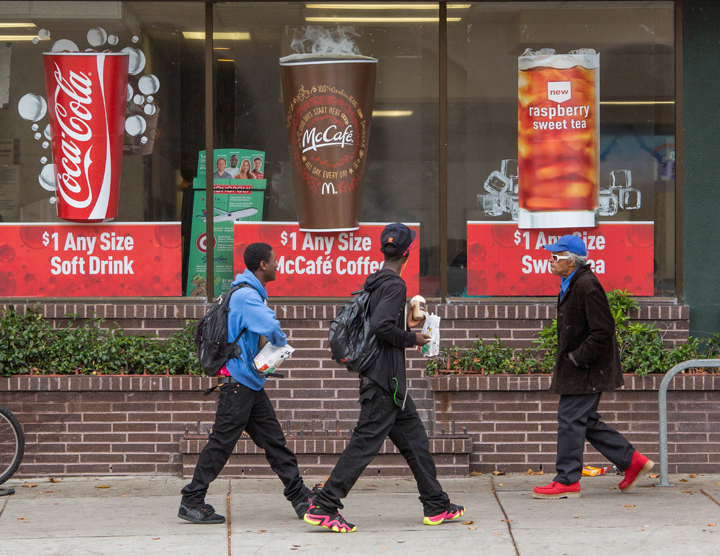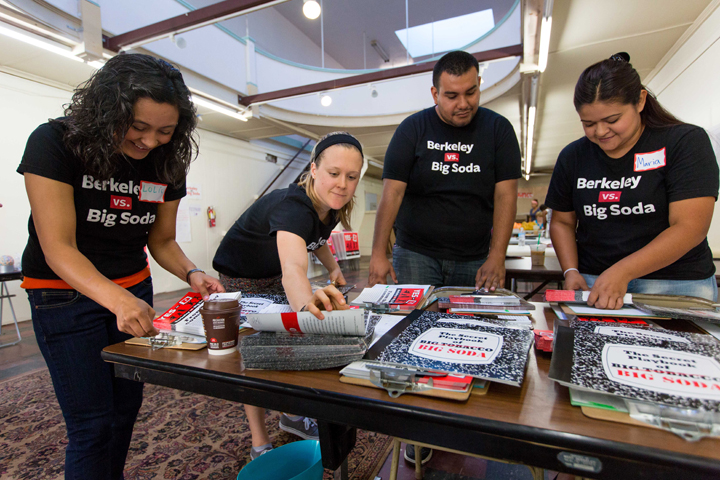
Lolis Ramirez, Ali Archer, Michael Guadamuz and Maria Tellez (left to right) spend a Saturday morning preparing materials for volunteers who will be canvassing for the Berkeley vs. Big Soda campaign.
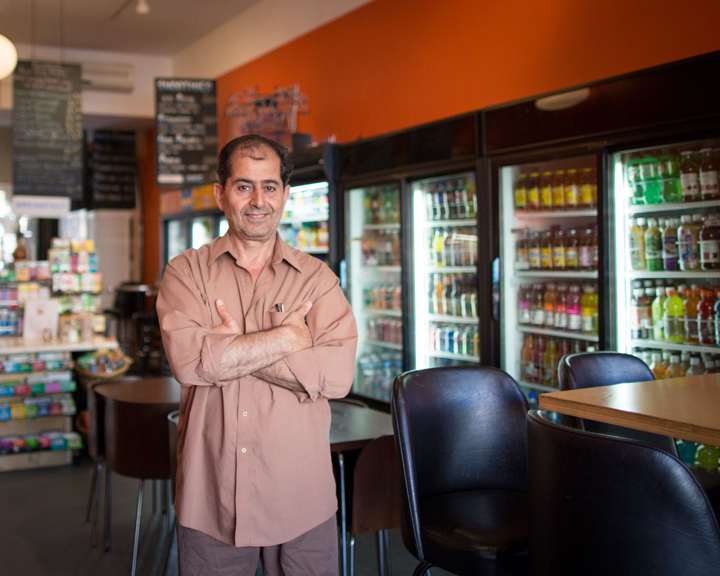
An opponent of the soda tax, Roy Mowrouzi, stands inside Café Rio, his restaurant at 2148 Center St. in Berkeley.
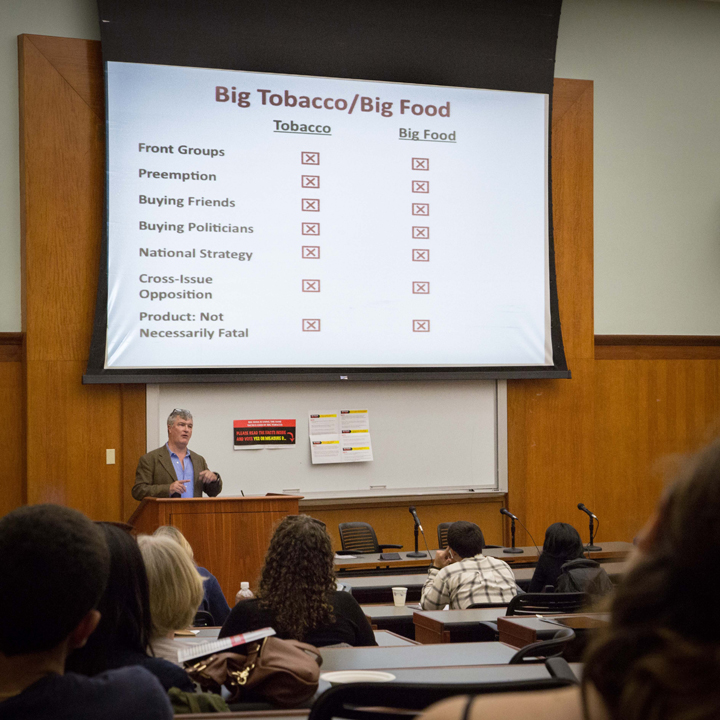
Mark Pertschuk is director of Grassroots Change, and former President and Executive Director of Americans for Nonsmokers’ Rights in Berkeley, California (1986–2007), during which time he ran a grassroots campaign to ban smoking on all commercial airline flights in the United States. At a public event in UC Berkeley’s Boalt Hall, Pertschuk demonstrates the symmetries between big Tobacco and Big Soda’s political strategies.
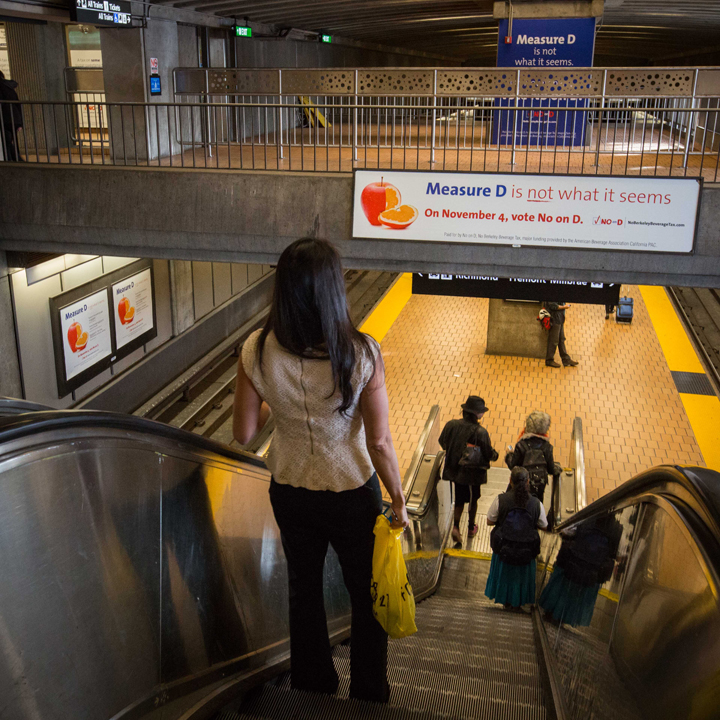
Implementing a strategy of saturated advertising (with unprecedented political campaign contributions from the American Beverage Association) and blanketing the city with its message, No on D has bought all of the available ad space in the Ashby BART Station.
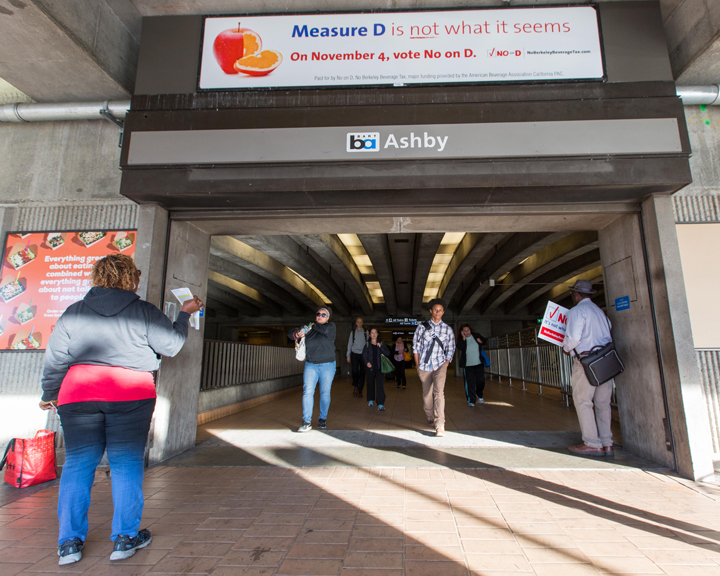
Employed by the No on D campaign, and funded by the American Beverage Association California PAC, a team of canvassers approaches BART riders with pamphlets and fliers. Though the canvassers would not engage in conversation, one of them communicated that they had been instructed not to speak with members of the press.
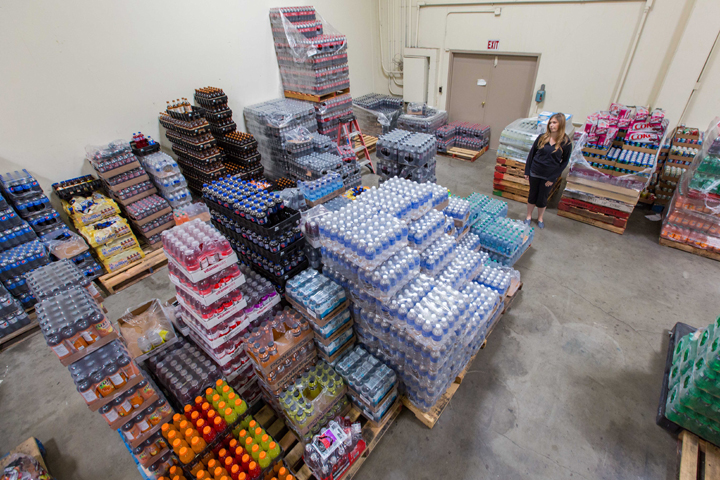
Jennifer Skidmore, sales manager at J&J Vending Inc., among the company’s warehoused inventory of beverages. “I just don’t think the tax is going to solve childhood diabetes…,” she said. “If I believed the tax was going to go to help the children, I’d be all about it. The truth of the matter is that it’ll just go to the consumer anyway, just like any other tax does. They don’t have a plan for the tax. It’s a tax without education.” Skidmore, whose grandfather and father started the business in 1978 out of their garage, is also a board member of the California Automatic Vending Council.
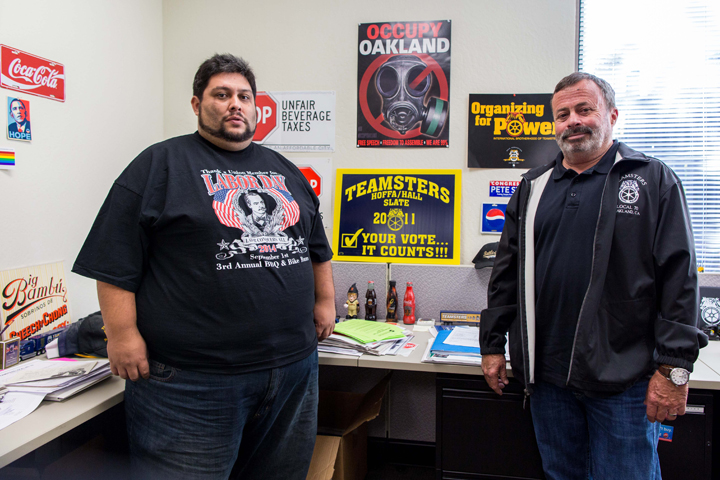
Teamsters Local 70’s Recording Secretary Ruben Bustillos (left), and Business Agent Lou Marchetti (right), have aligned themselves with the soda companies on this issue. They stress that the tax is a regressive one, and that government continues to hand out tax breaks to the rich, while taxing the average working person. Under the Teamsters Local 70 contract, entry-level positions at the beverage companies pay between $15 and $20/hour — some reaching $25 within the first year. These jobs provide pensions and health and welfare plans. Marchetti is concerned that the public doesn’t realize that good jobs are provided by the industry for young adults who can’t afford college, with some companies even offering tuition reimbursement programs.
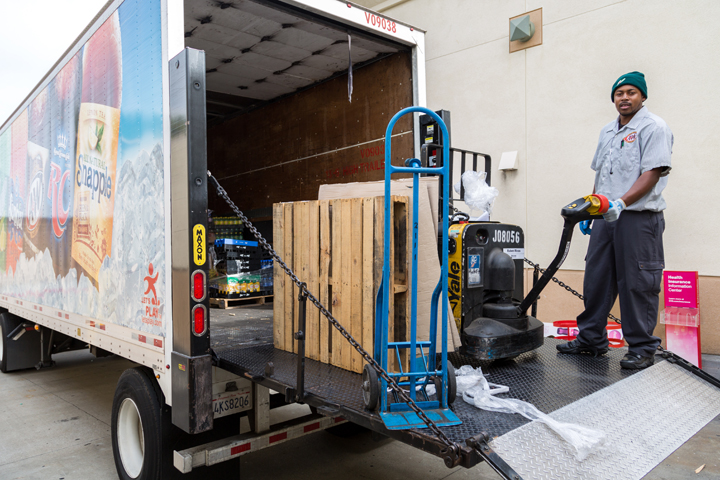
John Maze, 29, is a delivery driver employed by 7Up, and under Teamsters Local No.70 contract. He worries everyday about the toll the tax will take on his work hours.
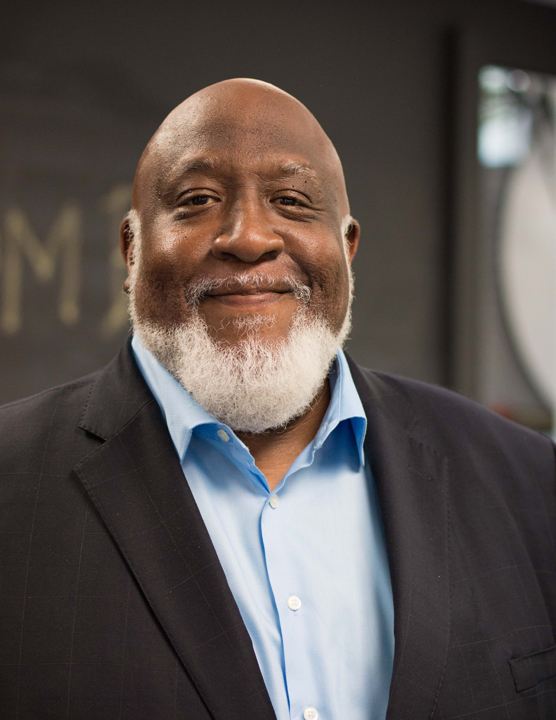
Councilmember Darryl Moore, who represents City Council District 2 in the City of Berkeley. “I suffer from type two diabetes, as have my uncles and cousins. I’ve had aunts who’ve lost limbs and an uncle who went blind because of diabetes. So, this soda tax is very important to me… We know the taxes we have on tobacco have led to a decrease in tobacco smoking. I’m hoping, and think, that it will lead to a reduction in the consumption of sugar sweetened beverages.”
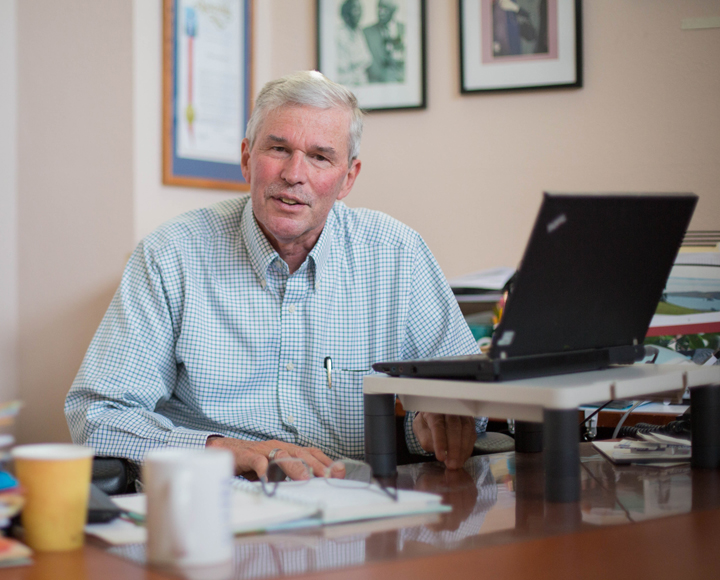
Dr. Marty Lynch, Director of Lifelong Medical Center, has been with the center since 1980. Since then, he’s seen a tremendous increase in the amount of children’s diabetes in the population. “We’re a healthcare provider, especially for low-income people. We’re all in favor [of the tax] because we see the kids with diabetes. We see the elder people with health problems. Getting people to eat healthier is a good thing, and soda is not high on my list of healthy foods.”
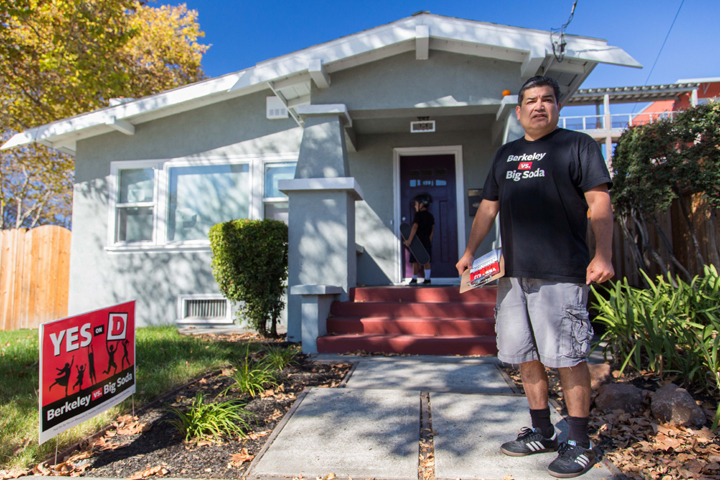
Executive director of the Latino Coalition for a Healthy California, and Berkeley vs. Big Soda volunteer, Xavier Morales stands outside his Berkeley home.
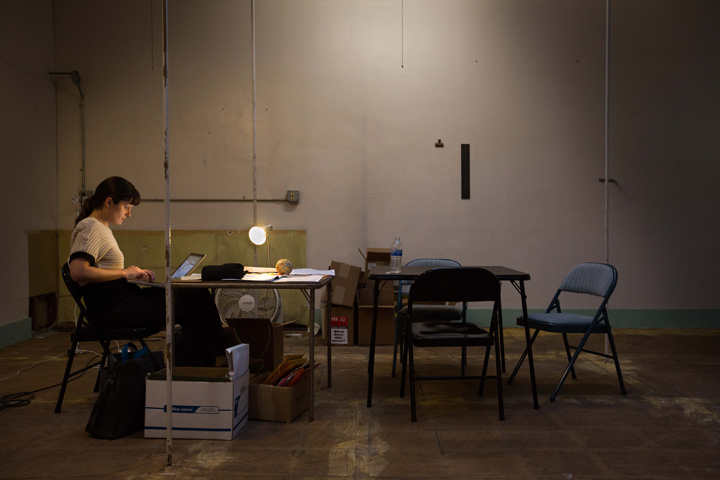
Sara Soka, campaign manager for Berkeley vs. Big Soda, works late at the Yes campaign’s headquarters in downtown Berkeley, with a small team of telephone canvassers volunteering below her makeshift second-story office. Soka, who holds a master’s degree in population health sciences from the University of Wisconsin-Madison, said: “Unless we take action, 40 percent of all kids in the U.S. will get Type II diabetes in their lifetime. The rate is even higher for African-American and Latino kids, at one in two. Science shows soda and other sugary drinks are clearly tied to an increased risk of diabetes, while the beverage industry spends billions marketing to kids, especially in communities of color. I want fewer families to have to watch a loved one suffer from this disease, or lose someone early due to its complications. As a nation, we have to stand up. We’ll do it one city at a time.”
